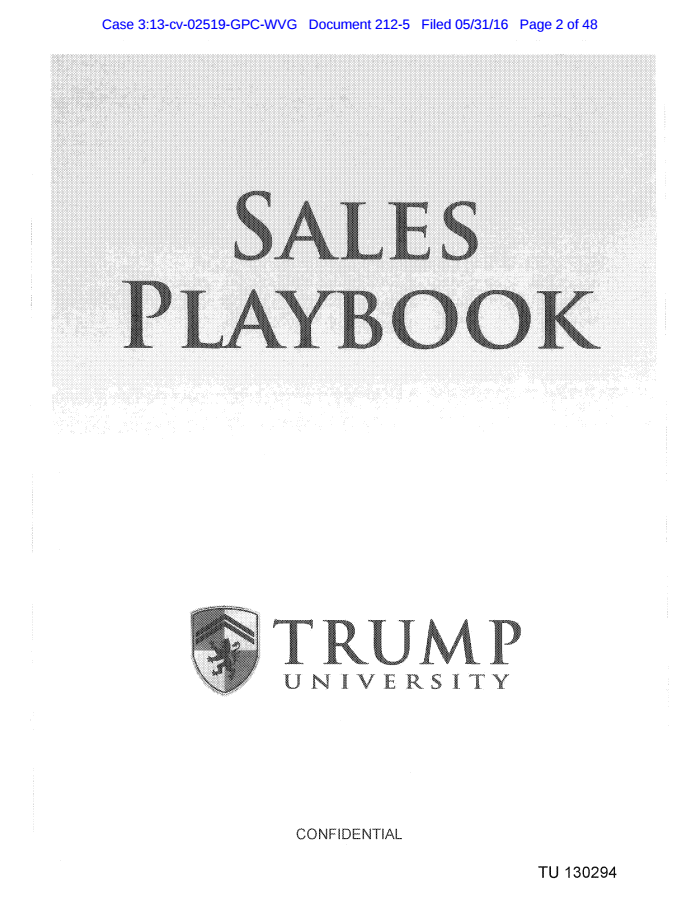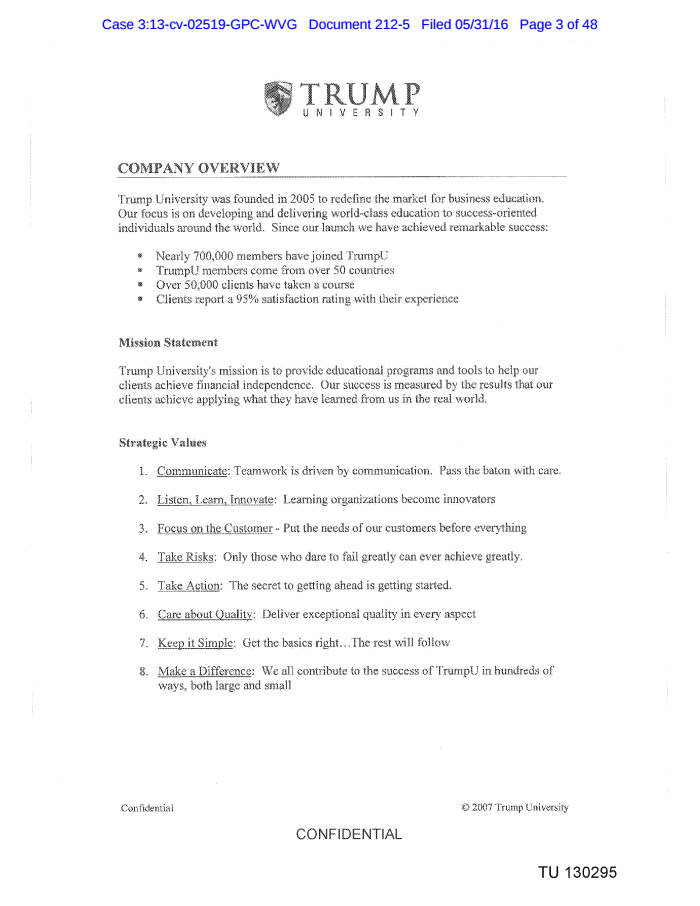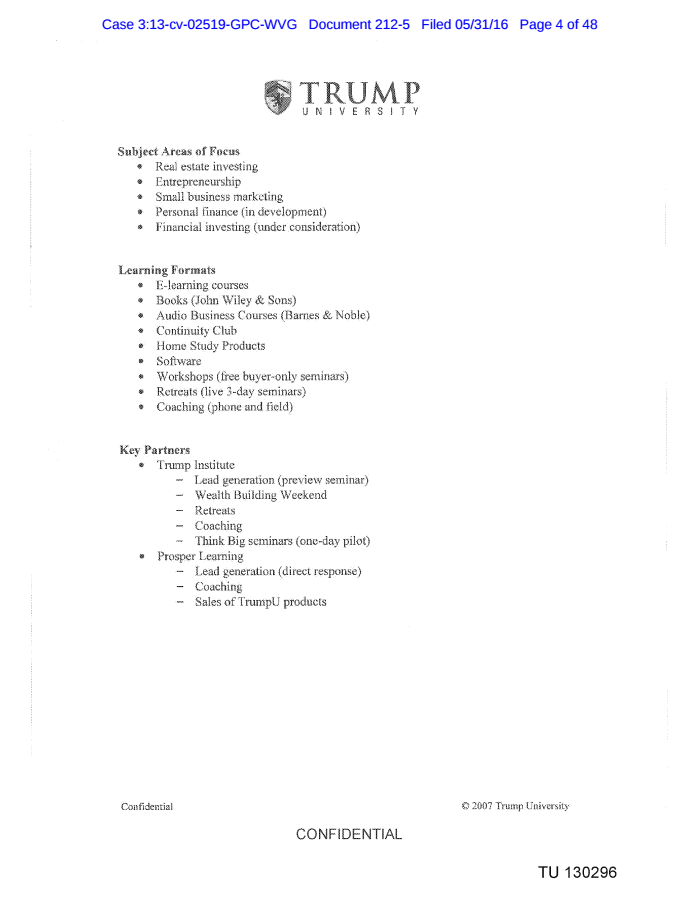From Wikipedia: The Spanish Prisoner is a confidence trick originating in the late 16th century. In its original form, the confidence trickster tells his victim that he is (or is in correspondence with) a wealthy person of high estate who has been imprisoned in Spain … The confidence trickster offers to let the (victim) put up some of the funds, with a promise of a greater pecuniary reward… Modern variants include the advance-fee scam, in particular theNigerian money transfer scam. In the Nigerian variation, a self-proclaimed relative of a deposed African dictator offers to transfer millions of ill-gotten dollars into the bank account of the victim in return for small initial payments to cover other expenses.
Now that it is a foregone conclusion - according to Herbalife's (NYSE:
HLF) own pronouncements - that the FTC has indeed found something rotten in HLF, the sound and fury of absolute denial is subsiding. Reasoned proposals for restitution and remedy finally can be considered.
The FTC has been presented evidence of a wide array of wrongdoing, including a fake "business opportunity", misleading "disclosures", phony "education degrees" (as in Trump University), a bogus "sales leads" scam, recruiting centers posing as "nutrition clubs", and the documentation of nearly 100% loss rates among the millions that join at the bottom of the Herbalife "marketing" chain.
Yet, history has shown that in the bizarro realm of "multi-level marketing", remedial measures aimed at any specific practices and which require voluntary compliance or government monitoring don't work. Government fines are absorbed as business costs. Even MLMs that were shut down following prosecution quickly resuscitated in virtually identical form under new names with the same kingpin recruiters. MLMs are Hydras.
In the Herbalife case, therefore, the public interest could only be protected if the FTC identifies and prohibits fundamental elements of the company's "MLM" model that manifestly deceive and cause harm.
FTC's Self-Inflicted Dilemma
The necessity to address toxic fundamentals explains why the FTC has taken so long. The FTC has made it nearly impossible for itself to protect the public from MLM deception and harm by declaring that "multi-level marketing" is legal. It did this without establishing a legal definition of MLM and absent any monitoring or industry research to verify MLM's economic impact or prevailing marketing practices.
Unlike franchising, MLM is not only legally undefined and real-world unresearched, it is also exempt from any FTC disclosure rules. When fraud is recognized in MLM, as it often is by the FTC, SEC, and state AGs, the FTC laboriously applies its theoretical definition of MLM that is based on distributors profitably retailing products to the general public as the core "business opportunity", i.e., direct selling. It must then test the prosecuted MLM against this theory. This "complex economic analysis" of the offending MLM can take years. The approach diverts attention from FTC acknowledgment of massive consumer losses, rampant deception or from making any fact-based assessment of how MLM actually operates as an "industry".
The FTC's definition of the MLM industry, which it presumes is valid and treats as legal, starkly conflicts with Main Street reality. It also, clashes with the definition of MLM espoused by MLM's own official trade group, the Direct Selling Association. The FTC's conflict with the DSA over what MLM is ought to be a wake-up call to the FTC that it is operating on faulty premises.
If that were not enough to alert the FTC that its approach is inadequate, a current bill before Congress,
HR 5230, introduced and backed by the DSA, effectively outlaws the FTC's current criterion for enforcement purposes. The proposed law would legally permit
all recruiting-based rewards to be funded by "reasonable" monthly purchases made only by those
inside the MLM marketing plan.
MLM's self definition, in conflict with the FTC's definition of MLM, is based primarily on "self-purchasing" by the distributors themselves at non-negotiable contractual pricing, not on retail selling to the general public. The DSA maintains that all MLM distributors are also end-users, a first in the world of distribution.
There is, however, one other factor in the Herbalife/MLM plan that must be considered fundamental and primary and that is universally recognizable as a hallmark of fraud and a cause of the financial harm. If Herbalife's plan were stripped of this one factor, its capacity to deceive and harm would be drastically curtailed, apart from anything else the FTC might do for restitution or remedy. This factor has mostly been ignored or overlooked because analysis has been focused on other areas. In MLM pyramid scheme terms, this factor is often called the "pay-to-play" element, but it is better understood as the classic "Spanish Prisoner" trick or the ubiquitous Nigerian Scam.
Much of this essay on this pay-to-play factor is excerpted from a
letter to the chairperson of the FTC, Edith Ramirez, signed by me as president of
Pyramid Scheme Alert, urging the FTC to ban Herbalife's harmful pay-to-play practices. Further explanation is in the essay by attorney Douglas M. Brooks published Jan. 29, 2016, in the
Seeking Alpha forum, entitled
Multi-Level Marketing: A Modest Proposal.
Getting the Money
This primary fraud factor and first cause of harm is the classic trick of making a false promise of great riches (wealth beyond your wildest dreams) that requires a ransom payment (product purchases) to receive. In reality, of course, the riches do not exist (see the Herbalife income disclosure and churn rate regarding the truthfulness of its "reward" promise).
Concerning Herbalife, much legalistic attention has been focused on where HLFultimately get its money that is transferred to recruiters. Does it come mostly from purchases made by those inside the closed recruiting chain, the distributors themselves, or do those distributors get the money from their retail customers in open marketplace retail sales?
This is a valid interest for regulators, but the approach steps over the first cause of fraud, revealed in the classic Spanish Prisoner trick. The primary act of fraud is in how the scam induced payments from the victims, not how the victim got the money that was given over to the trickster. What has been hidden in plain sight are Herbalife's means and methods of getting money from consumers in the first place. It is classic Spanish Prisoner.
The Mystery of Herbalife Shoppers
Though the specific means of gaining funds has not been generally addressed, Herbalife's sales success has always been a mystery to financial analysts and sales experts. Sales companies rely on branding, advertising, convenient and efficient distribution, competitive pricing, customer service, or uniqueness or differentiation in products to stimulate sales. Some businesses, over time, can rely on the hard earned loyalty from a stable customer base, augmented by word of mouth to produce growth.
Herbalife uses none of these means. Sales force and customer turnover may be as high as 80% a year. There is no "loyal" market and no need for superior "service". Millions of people buy Herbalife products, inexplicably, in spite of the availability of the same types of goods at much lower price. Amazingly, some buy thousands of dollars of Herbalife products without having tried the goods. Herbalife buyers do no comparative shopping! And most incredibly, in order to buy, they sign onerous, restrictive contracts limiting their ability to return goods, criticize the company, negotiate pricing or to earn income from other MLMs. Then, after all that, the vast majority abruptly stops buying in less than a year. The smell of fraud is unmistakable.
Preposterous Claims Point to Bright Line
Almost as fantastic as ransomed aristocrats and deposed Nigerian dictators, Herbalife argues to investors and regulators that these purchases are ordinary consumer transactions. The fantastical offer of "unlimited" rewards that can only be accessed by joining the chain and purchasing product is said to have no effect on nearly all who sign and buy. Purchases are supposedly driven only by love of the high priced, unadvertised, commodity product, or, for some, to resell the products, though this alleged activity is not verified or measured.
Herbalife has sometimes argued that purchase quotas can be fulfilled by the downline's purchases, not the recruiters' own, thus making purchasing "voluntary". This is even less convincing than the story about a Nigerian dictator needing my bank account number to place his fortune. The FTC should just ask for evidence of such non-buying recruiters meeting their "volume" quotas. Spanish Prisoner ransom payments were similarly not "required"; however, access to a share of the rewards from the grateful nobleman could not be gained without payments. Buying products (ransom payments) is inextricably linked to accessing the promised Herbalife rewards.
The means used by Herbalife to generate "sales" (Spanish Prisoner payments) are the effective purchase requirements, in the form of personal purchase quotas. Therein lies the FTC's opportunity and likelihood of remedial action to identify and regulate the "bright line" of fraud in the Herbalife proposition.
Court Ruling Support
The recent federal court order against Vemma confirms effective purchase requirements as a key element of Vemma fraud and supports an FTC ban on Herbalife's pay-to-play scheme. The volume quota that can be met by personal purchasing is what the Vemma court ruling called one of the "features of Defendant's Marketing Program and bonus structure that tie bonuses primarily to recruiting and to the purchase of product principally to stay eligible for those bonuses." At Herbalife, as at Vemma, higher-level qualification for recruiting-based rewards can be gained right at the onset of participation by making a significant product purchase personally, costing hundreds or thousands of dollars.
The possibility exists - with the Vemma and Burnlounge federal court rulings serving as the most recent and relevant guidelines - for the FTC to ban theSpanish Prisoner payments from the Herbalife compensation plan as an inherently unfair and deceptive trade practice. Within Herbalife's sales and marketing plan, the FTC can and should prohibit all recruiting-based incentives, quotas or requirements upon individuals that include their personal purchasing, thus taking away Herbalife's means to unfairly and deceptively gain payments based on promises of rewards tied to "endless chain" recruiting, aka Spanish Prisoner rewards.
Suggested FTC Language
"As Herbalife offers all participants in its marketing plan the opportunity to gain payments that are facially related to unlimited and endless recruiting of new participants into the marketing plan, it may not require purchases or offer financial rewards to participants or impose financial penalties based in any way upon the level of their own personal product purchases that are related to such rewards. Personal purchases also may not be factored, positively or negatively, in the individual participant's own group volume-based rewards that are tied to recruiting new participants. Personal purchase quotas and incentives, when related to participation in the recruiting-based reward plan, constitute unfair and deceptive marketing practices."
Bright Line
That Herbalife's and other MLMs' participant purchases are effectively requiredand are tied to future recruiting rewards is obvious. Herbalife's pay plan includes specified initial purchase levels needed to establish various reward positions and periodic purchasing required for maintaining positions. The pay-to-receive recruiting-based rewards are presented as personal purchase quotas, which can be included in the recruiters' "group volume" quotas. The resulting practices of Herbalife participants making personal purchases in order to join the pay plan, prevent losing rewards or to reach higher levels of recruiting-based rewards are well documented.
No Business Defense
Apart from creating false demand or "conscripted purchasing", Herbalife cannot defend personal purchase quotas in rational and legal business terms. Herbalife provides no protected retail sales territories to any participants and no market support for retail sales activity. To the contrary, Herbalife places extraordinary obstacles against those who would seek to profitably sell its products at retail prices. With its "unlimited expansion" model, financial incentives to recruit other wholesale participants and its inherent mandate to increase the total number of participants in all areas without regard for market saturation, Herbalife fatally dilutes and undercuts a profitable retail selling opportunity for all existing participants.
A personal purchase quota or the option to add personal purchases for authorization or maintenance of recruiting-based reward status, therefore, cannot be defended on retail (direct selling) business terms. It is obviously a device for inducing purchases (payments) to sustain the recruiting-based reward plan. Personal purchasing quotas fund the recruiting rewards.
No Effect on Direct Selling or Retail-Based Team Building
While preventing fraud, this proposed restriction would not interfere with anylegitimate business that Herbalife distributors might transact. An FTC restriction of personal purchase quotas, i.e., Spanish Prisoner Ransom Payments, does not, for example, inhibit purchasing by Herbalife's participants for personal retail selling, i.e., direct selling, or for any other business or personal purpose, including "self-consumption" or giving products to friends and relatives. Why they purchased or what they do with the products afterward is not monitored or verified in any event.
By itself, the restriction would also not prevent activities related to recruiting other participants into a personally organized or extended marketing "chain" on which rewards are based upon aggregate purchases. Uplines could still implore downliners to buy, however, the downliners' personal purchases, apart from helping the upline recruiter and Herbalife itself, would not benefit the buyer in any way relevant to the reward plan, except for retailing purposes.
The restriction would have the enormous consumer benefit of preventing Herbalife from inducing or effectively requiring inventory purchases for joining its devious and harmful recruiting-based reward plan (ransom reward). It would disallow and make it impossible for personal purchasing to be used to maintain a position in the plan or to increase rewards. It would prevent financial penalties (reduction in rank, lowering of commissions) related to the recruiting-based rewards for not making personal purchases. A participant's personal purchasing could not be part of that individual's own group volume that is a determinant of recruiting-based reward status.
Enforcement Challenges
Though the FTC has historically maintained that the MLM participants' "retail" sales, not the MLM participants' internal wholesale purchases, must be the main and ultimate funding source of recruiting-related rewards, no regulatory means exist for ensuring that recruiting-related rewards are actually obtained from purchases ultimately made by consumers who are not in the marketing plan.
Banning the unfair and indefensible practice of allowing or requiring personal purchases to fulfill quotas that are tied to the recruiting-based reward plan will prevent the means of "inventory loading" or continuous pay-to-play policies that induce mounting victim payments. Breaking the link between personal purchasing induced by quotas, incentives and penalties and recruiting-related rewards reduces the need for verifying or measuring retail sales that might or might not follow purchases. A clearly stated prohibition of personal purchase quotas tied to recruiting-related rewards will serve as an immediate, long-term and unequivocal deterrent.
By ending Herbalife's policy of personal quota purchasing, the FTC would free Herbalife to participate in the open market where value is fairly and openly determined and sales are based on market demand. Herbalife could still claim it has an enormous fortune waiting for those who sell its products. But no one would ever again have to pay a ransom to gain access to those fabled rewards.
Robert FitzPatrick (copyright 2016)



